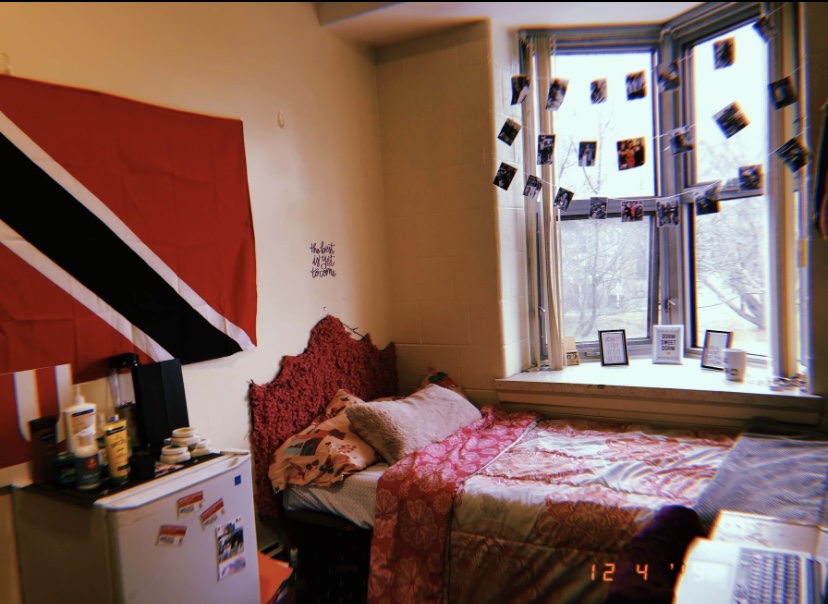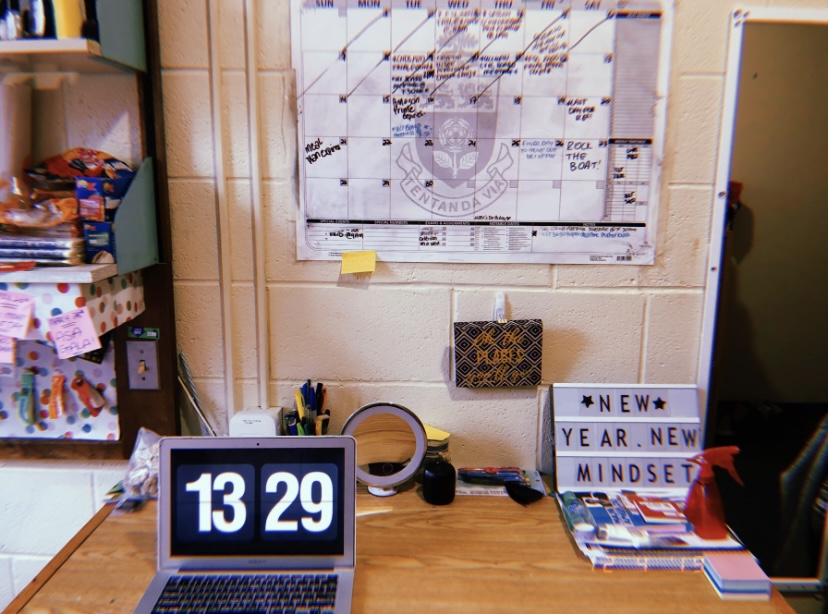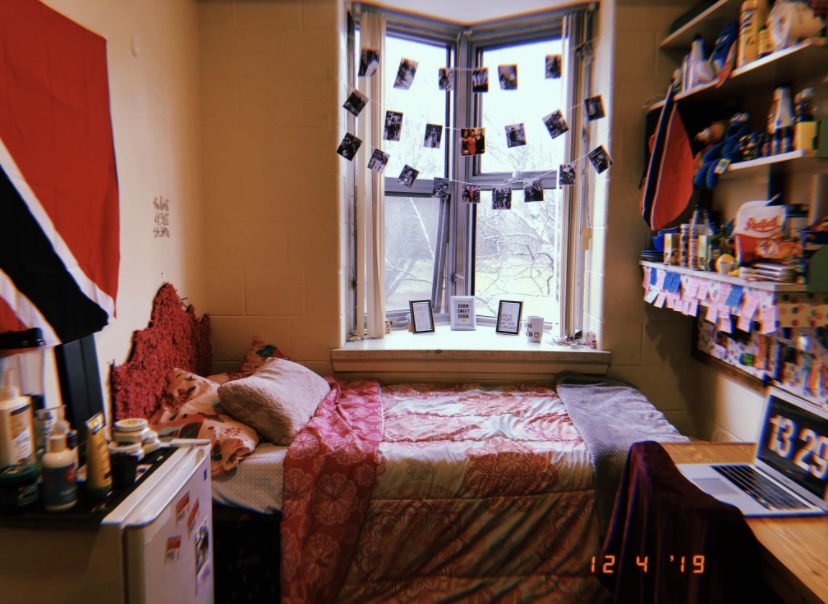Residence/Dorm life + Living on a meal plan
- Maya Hinds

- Feb 10, 2022
- 7 min read
Updated: Oct 18, 2023
Does your school offer on-campus housing? If yes, have you been looking into living on-campus, or in the dorms? Then this post is just for you!
Ah. Residence.
If I could sum up my residence, on-campus living experience in one sentence, it would be:
✨"what an interesting learning experience"✨
To this day however, I still believe that living in a dorm on-campus played a major part in my transition to living in Canada - In terms of being all on my own for the first time, learning how to live and move about in an entirely new country, and ultimately, learning how to live in, and share a space people who may or may not have similar levels of broughtupsy** and living habits as you.
**

Having lived in one of the many residence buildings at York, I can only talk about my experience from my specific campus and building I lived in, but who knows, maybe you may share in some similar experiences, or my pros and cons list towards the end of this post can be of some help!
Applying to live in residence or in a dorm on-campus
At York (notably the Glendon campus) they offer different room sizes depending on what campus you're on and what residence you're applying to live in.
I went with the small single room option two years in a row - my main reason being the price, as it was the least expensive option for single occupancy, at the time costing $5,997.00CAD.
With residence being as expensive as it is, paired with a separately charged mandatory meal plan, I was trying to have as little of a financial impact on my parents as possible.
The small single room was noticeably smaller when compared to a regular sized single room, but since I was the only person in my room most of the time, it was cozy enough to accommodate just me.
I tried to doodle up a little room outline to help visualize what my dorm looked like. It's a bit exaggerated but hey.

All the rooms no matter their size had the same furniture; the usual twin-sized bed, chest of drawers and closet, desk and chair, wall shelving etc. The only difference is that regular-sized rooms had an extra chair, so I personally didn't feel like I was missing out much.
Plus, a huge advantage of a smaller room, is less space to clean. Unfortunately the floors in my building were carpeted, which were a huge pain to clean every now and again, so I appreciated the smaller space.
In my first year, I applied for residence in April, and by late May I got the approval email which included documents such as my offer letter which stated the building, room type and room number I would be in. Here I also had to select which type of meal plan I wanted (they were based on the prices, with the cheapest plan at the time being the bronze plan at $2,950.00CAD), and also check off if I would accept or decline the offer.
The last bit of the offer letter was a notice of a $250 non-refundable room reservation deposit I had to pay before the end of the month to ideally, secure my room - and additional documents that broke down the occupancy agreement (rules, what's allowed vs. what's prohibited etc.) and a fee and payment schedule, where you had the option to either pay the full accommodation fee up front in the fall semester, or have the total fees split between the fall and winter semester.
To my understanding the process is relatively similar in other schools, but the prices have increased quite a lot over the years.
Initially, when I first got accepted to York and applied for residence, I really wanted to stay in a double room, because it meant I could have a roommate.
I wanted to live the whole Disney Channel original movie fantasy of meeting my BFF on the first day of orientation week and randomly finding out we were roommates after meshing so well together - us staying up all night talking about all the classes and boys on campus stressing us out, you know, everything they made university seem like on TV.
Plus, the double rooms were the cheapest out of all the options offered on campus - but the process of finding a roommate through the matching portal they had at the time was taking too long, and I wanted to secure a room before all the spaces were gone, so that's how I ended up applying for a small single room.
Here's a brief look at what my dorm looked like in second year; First-year Maya did a terrible job at decorating, Second-Year Maya didn't do much better.
Your residency agreement + finding additional storage
Unless stated otherwise, an on-campus residency agreement is typically for the academic year, or two semesters, (The eight (8) months of September - December and then January - April.) Your offer letter should state the duration of your stay (move in date, move out date etc.)
HOWEVER: (Specific to some YorkU residences) you aren't meant to stay in residence over the holidays/Christmas break. To stay in residence during this time if you're not able to return home, whether home is a 40-minute drive away, or six hours away by plane, you have to pay a holiday closure fee, which was about $400 - and this is only after you apply and if you're approved by housing to stay over the break.
I'm grateful I was able to fly home during Christmas when I lived in residence, but for those who could not return home, it's a pretty steep fee.
If you are able to leave residence over the holidays though, since your residency agreement is usually for the academic year, you can keep all your belongings in your room and don't need to find storage units for the holiday break since you'd be coming back in January.
Just make sure you don't forget to lock your door, and don't lose your dorm keys abroad, or wherever you go over the holidays, because you guessed it, there will be replacement fees.
At the end of the academic year, there's typically a final move out date where ALL students in residence who are not staying for summer residence (if this is offered at your school) have to move out by, which is usually the last week of April.
However, especially as an international student - if your travel or moving plans are set for after that final set day for all students, you would have to communicate this with housing as soon as you can, as there are usually additional fees that apply per day if you have to stay beyond the agreement end day, but this is all dependent on if the housing at your school allows this.
The rate at the time in 2018 at Glendon at YorkU to stay beyond the official move out day for an approved reason was $30CAD per night. I'm unsure if it's changed since then though, and what the additional day rate charges would be at other residences or schools, if they allow students to stay additional days, as not all schools have this option.
The university and residence buildings also don't usually offer any additional storage options aside from what you have in your room. By additional storage, I mean a storage locker or unit separate from your room, to store bulkier things, or anything extra when it comes time to move out of your dorm. If you are in need of additional storage, you'll have to find it on your own.
At the time, SecondCloset was the answer to that problem for me. They were a storage company who came directly to my residence building to pick up items I needed to store, like my mini fridge, and whatever I wasn't taking with me to go home that summer that couldn't fit in my suitcase.
Unfortunately, SecondCloset has rebranded to a businesses called Bolt who are now focused on e-commerce and business order fulfilment, and are no longer a storage unit for the everyday person.
If you're in need of a storage locker or unit, or just want to explore your storage options, you can click here to be taken to a website to find storage units near you.
I paid about $40CAD a month to store two large boxes and two bulky items at SecondCloset when they were in operation if you want a reference when doing your own storage unit research. I was also charged a one-time return fee of $28.25CAD.
Canadian Tire and Home Depot are great store locations to get inexpensive cardboard moving boxes of all different sizes, and other packing materials like duct tape, bubble wrap and more. Eg. At Canadian tire, a larger moving box (18" x 18" x 24") costs $3.39CAD.
I'll split the rest of this post into a drop down list of pros and cons about living on residence/on-campus, since like all experiences, the dorm life had it's share of up and downs - but I'm still grateful to have been able to have the experience, and share it with all of you reading!
PERKS OF LIVING ON RESIDENCE/ON-CAMPUS
(1) Proximity to campus!
This is probably the biggest benefit to living on residence. (Tap here to read more)
Some people have to commute 1-2+ hours just to get to campus for one class, but as an on-campus resident living on residence, or "res," you have the convenience of nothing more than a 5-10 minute walk to get to your classes (depending on where your residence building is located.)
I loved having the option of going back home to sleep in-between classes that had a long break between them, and you also get early notice of any activities and/or events happening on campus. In a word, life on residence is convenient.
Need to finish a paper and need the library resources? It's just a quick walk away.
Woke up at 8:30am and you have a 9am class? - You still have enough time to get ready quickly and make it on time.
(2) Friends being right down the hall!
Can you say one big, continuous sleepover! (Tap here to read more)
If you made some friends during orientation week, and even beyond that, like befriending people in your classes, or other people who also live on-campus, then life in residence is like having a big continuous sleepover with some of these new friends. They're usually no more than a couple doors or floors, or a building or two away, making it pretty easy for everyone to get together and lime (this is a term we use back home which means to hang out.) It's extremely convenient to have a stay-in girls night, all-nighter study sessions the day before a big exam, or get some quick advice from a friend and so much more.
(3) Meeting new people is a lot easier!
Neighbors turned friends! (Tap here to read more)
A lot people live on residence, so even if you didn't make a bunch of friends during orientation, or in your classes, which is normal, there's usually a ton of residence activities going on throughout the school year, giving you extra opportunities to meet new people and make new friends. You'll also meet a lot of other international students, and it's always fun to meet people from all over the world. If you're open for it, you can have some pretty exciting cultural exchanges!
(4) It’s a good backup option!
Apartment hunting is stressful, especially when you're new to Canada (Tap here to read more)
If you were unlucky like me in my second year, and your housing plans fell apart, whether it be that you couldn’t find somewhere that fit in your budget, or the people you were trying to move off-campus with just ended up being unreliable, don’t completely shut the idea of residence out, especially as an international student.
Remember that the earlier you apply the higher your chances of being accepted, so set a deadline for yourself to either find a place by, or apply or re-apply for residence by.
Apartment hunting can be quite pricy, but also extremely stressful, especially when you're brand new to Canada, or you aren't even in Canada to physically see the places you're looking to live in. So always have a backup plan.
For second-year me, residence ended up being my ultimate-last-minute-backup-option after my plans of moving off campus with some former friends crashed in a matter of days, and I was left on my own trying to find out where I was going to live.
As a result, I re-applied pretty late, but was extremely grateful to have been re-accepted to live in residence, especially since I had no idea where I'd be living that year if I wasn't.
DOWNSIDES OF LIVING ON RESIDENCE/ON-CAMPUS
(1) Mandatory meal plan
Most residence buildings require residents to also buy a mandatory meal plan, where the price is not included in your residence room rate. (Tap here to read more)
I’m not sure how it is with all schools, but with York and a number of other schools in the GTA, if you’re living on residence, a meal plan is compulsory, adding roughly another $3,000+ onto the already not so cheap residence fees.
The way a meal plan usually works is like a debit card, where the meal plan amount you chose and paid for is added to your student card (or a meal plan card if you school offers one) and you just tap the card to pay for a meal on-campus. Be mindful of your spending if you went with a cheaper plan, because it's ideally meant to last for the entire academic year.
I'd often find myself eating the same thing regularly, since on-campus meals tend to be a little pricey depending on what you're feeling for. Some of the options available at York (mainly on the larger campus) included Popeyes, Hero Burger, Wendys, Wings, Caribbean food, Thai Food, Sushi and lots more.
We also had no kitchen access in my building, and many others at York (unless you were in a suite occupancy that came with a kitchen, or had a medical or religious exception to use the kitchen found in some buildings, which came with an additional fee on top of all the other residence expenses.)
Some schools do have kitchens that residents can use for free, so if you're unsure, just do some research on the residency offered by your schools, and whenever in doubt, send an email to their housing department asking any questions for anything you may be unsure about.
As a Caribbean person/immigrant though, I found the food at certain locations on-campus to be a bit bland, since they only really season food with salt and black pepper up here, if so much - nothing compared to the kind of seasoning we put in Caribbean cuisine back home.
(2) Residence bathrooms
Communal bathrooms (i.e. shared bathrooms) are quite the experience to say the least (Tap here to read more.)
I was not prepared for the communal, co-ed bathroom life.
I lived on a co-ed floor, meaning I wasn't sharing a bathroom with only female-identifying individuals, rather it was being shared with the entire floor of about 20 residents. I'd often find myself having to knock the toilet seat back down with my foot, or jumping from stall to stall to find a toilet that wasn't either filled to the brim unflushed or clogged by toilet paper, and always crossing my fingers, hoping the bathroom was empty any time I had to use it.
It would break my heart having my mind set on taking a shower at a certain time, getting my shower caddy ready, slipping on my shower shoes and walking to the bathroom, only to realize all shower stalls were taken, and there would always be that one stall that had someone's stuff in it, but the owner was nowhere to be found.
Special mention to those people who would be loudly coughing and spitting up phlegm in the shared shower stalls.
Also, no one talks about how weird and uncomfortable it can be having to take a shit in a shared bathroom.
My top piece of advice here - make sure on your list of things to get before you move in the dorm, that you include shower shoes at the top of your list. You never know what the person who used the shower before you was doing in there, trust me. You can never go wrong with cheap pair of flip flops.
If you're lucky enough to not have to share a bathroom, or you don't have to share a bathroom with the entire floor, maybe with no more than 3-4 people if so many, I'd say still take the precautions. Especially in these pandemic times, you can never be too safe.
(3) Inconsiderate neighbours
There is a possibility that you may not get along with everyone on your floor/in your building. (Tap here to read more)
Residence is really an experience where you learn that not everyone was raised, or grew up in the same way you did. You'll likely encounter people who have been used to doing things on their own for some time, vs. people who now have to do everything on their own for the first time.
Not everyone will have the same level of consideration or respect as you, so my best piece of advice is just be prepared for an annoying encounter or two.
There were a number of nuances in residence for me. People constantly slamming their doors no matter the time of day or night, my neighbours playing football in the hallway at 2am during exam season, bouncing the ball off my door every now and again, the residence walls being super thin - just to name a few.
There was also the occasional moaning and bed creaking sounds coming from all different directions all hours of the day, and night.
But hey, that's residence life for ya!
(4) Not being able to stay over the December holiday break for free, or at all in some cases.
During the holiday/Christmas break, depending on your school and residence, you may not get to stay in your dorm, or if you are allowed, you may have to pay an additional fee (Tap here to read more.)
I don’t know how it is for other schools, but while York residence does allow you to stay in residence over the holiday break (for an approved reason) they do not let you stay over the break for free.
AT YORK - In residence, unless you've applied, PAID, and been accepted to stay over the break, unless stated otherwise, you have a move out date which is usually 24 hours after your final fall semester exam. There's a bit of wiggle room around determining the 24 hours, especially if you don't really have final exams, rather final papers like me where the due dates fell during the exam period, but you'd have to communicate that with your housing office.
Note again that not all schools will allow you to stay over the December holiday period, so when doing your residence search, this would be a great question to reach out to your school's on-campus residence/housing office to inquire about, so you can truly understand what your options are when it comes to the holiday break.

(5) A number of rules
Agreeing to live in residence means you're agreeing to the rules set in place (Tap here to read more)
This isn't so much of a downside to life in residence compared to others on this list, but some of the rules were a bit tedious.
Obvious and understandable ones would be no smoking, and quiet hours after a certain time, especially during exam season.
Security based rules stemmed from having all guests sign in after a certain time, even if they lived in the building next door (I think it was after 7pm,) and the a limit on the number of guests. This has definitely changed in current pandemic times with many school residence buildings not allowing any guests at all.
Other rules included not being allowed to have a microwave in your room, or light candles - more security measures. What's allowed and what isn't would be noted in your residency agreement, and can usually be found on the residency's website.
They didn't allow us to have microwaves in the dorm rooms though, and this was my biggest annoyance because the walk to the common/dining room where the only microwave on the floor was, was all the way at one end of the hallway, and my room was all the way on the other end. :(
Overall, like any experience you'd have, there are fun moments and the moments full of regret, and I experienced my share.
After my second year, I left residence and never looked back. What's for you is for you, and residence just wasn't for me.
However, it is definitely something I'd recommend to all first-year or incoming students in particular.
Overall as an international student, residence is an amazing way to not have to worry about your living arrangements as you get acquainted with your new life in the city, especially if you have no family or friends in Canada to stay with, like many of us moving abroad for the first time.
It relieves you of some worries, knowing that you're set with your living arrangements for the next 8 months, and are free to get to know the city and your surroundings at your own pace, knowing you have somewhere to return to at the end of the day.
That, and some friendly faces a couple doors down never hurt.
Did you live in the dorms at your university or college? What were they like? What was your experience like and how would you rate it overall? Share in the comments down below!
Thanks for reading!











Comments